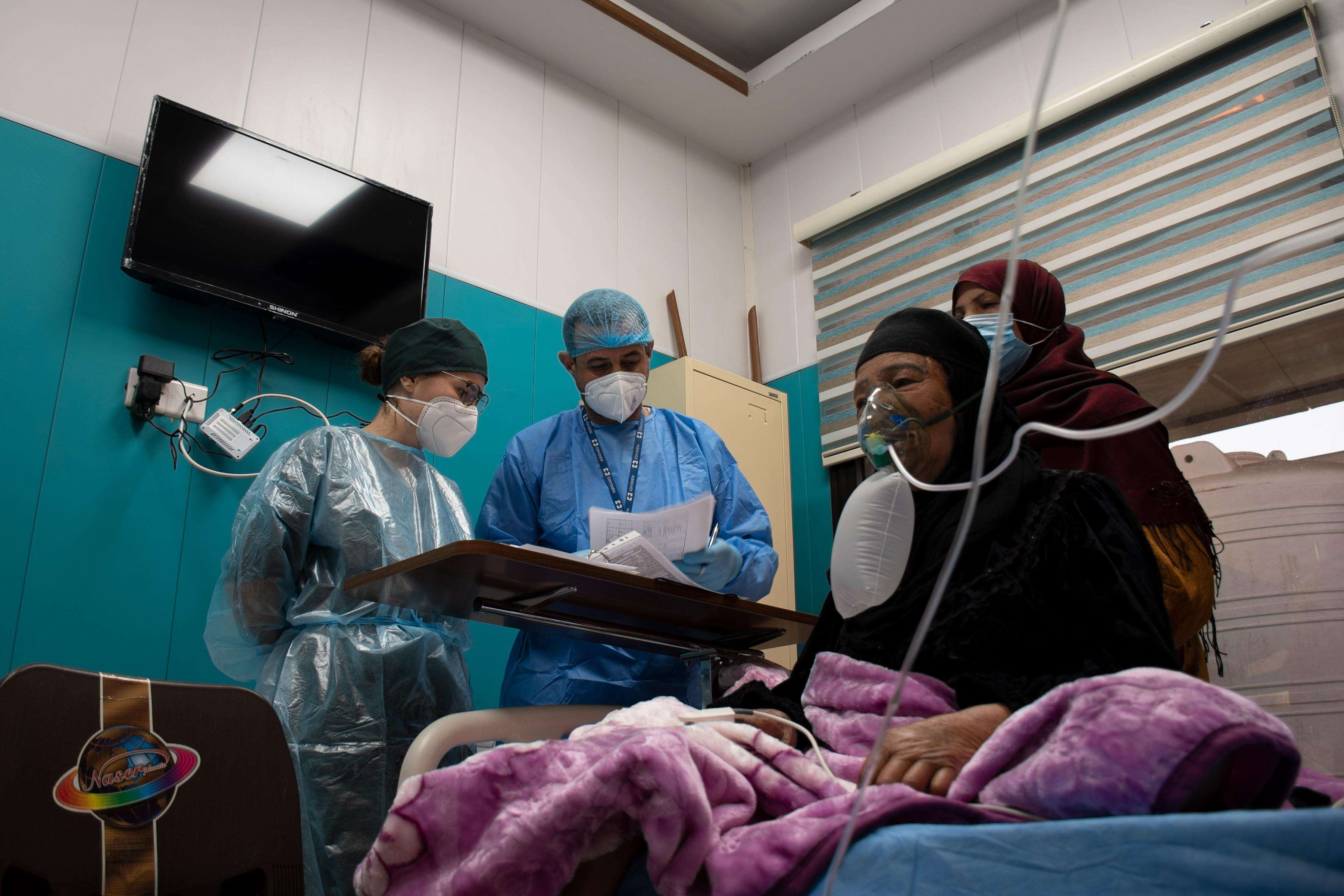In late July 2020, doctors and nurses in Baghdad began to notice something strange: While the intensive care units dedicated to patients suffering from COVID-19 were fuller than ever, wards for less severe cases were emptying out. “The hospitals had been over-capacity in Baghdad and people were scared, so they were resorting to home care,” said Omar Obeid, a Doctors Without Borders/Médecins Sans Frontières (MSF) project coordinator in Baghdad. “People stopped going to hospitals. They came only when it was so late that they were almost sure to die.”
Many years of war, beginning with the 2003 US invasion of Iraq, have prepared Baghdad’s hospitals for large influxes of wounded patients. But as COVID-19 began to spread through the city last summer, weaknesses in the overstretched health care system quickly became apparent. Even people with COVID-19 delayed coming in for treatment.
Hiba’s mother, Neamat, fell sick in November. “We tried to get her a test but we couldn’t,” she said. “We did a CT scan and saw that her lungs were all white, very damaged by the corona [virus]. As I’m a pharmacist, I thought that we could manage it at home. The hospital was the very last thing I thought of doing.” Eventually, however, Naemat’s condition deteriorated badly and Hiba was forced to bring her mother to a public hospital. “There was a different doctor every day and each doctor was writing a different prescription. There were only two or three nurses for about 20 patients. It was impossible for them.”
Lifesaving support
MSF teams supported the respiratory care unit of al-Kindi hospital throughout summer 2020. They saw first-hand the increasing needs and how the hospital was unable to cope with the flood of COVID-19 patients in need of close and consistent follow-up.
“It was understandable that we saw many staff scared of COVID-19 and hesitant to work,” said Gwenola Francois, MSF’s head of mission in Iraq. “What was more difficult was that often the senior doctors were absent from the hospital, and junior doctors were often unwilling to make vital decisions without them.”
MSF worked with health authorities to add its own COVID-19 treatment ward inside al-Kindi hospital, which opened in September with 24 beds. It has since grown to a 36-bed purpose-built facility. Within the unit, doctors, nurses, and other staff circulate in masks and blue gowns, taking vital signs, adjusting settings on ventilators, and explaining courses of treatment to worried family members.
This communication is especially important in a unit that has treated many very sick people, with the death toll reflecting the seriousness of the cases received: There were 168 people admitted between September 2020 and February 7 2021, and 86 of them died.
“Medically, the situation here has been very difficult,” said Dr. Aurelie Godard, MSF’s intensive care referent who worked in al-Kindi in September and October. “As patients have been hesitant to come to the hospital they are arriving very late, with very low oxygen levels and lots of complications. When we started the mortality rate for critical patients was almost 100 percent, and although we’ve brought it down it’s still very high. But working with the Iraqi colleagues was amazing—we quickly developed new ways of working together and started to be able to discharge some patients that previously would have died.”
“In the first days of my work I was a little bit hesitant,” remembers Mahmoud Faraj, a nurse from near Mosul who works with MSF in Baghdad. “I was thinking about driving for five or six hours to work with the corona [virus] while other people were fleeing from this new dangerous disease. But when I eventually worked with the patients and saw how people’s conditions change and how happy they become when they improve, I felt that I’m providing a great service.”
A resurgent pandemic
There is a jarring contrast between the world inside the ward—where many sick people struggle to breathe, or lie unconscious with machines breathing for them—and the world outside where life seems to continue without much sign of the painful toll that COVID-19 has taken on Iraq. Though the government has mandated the use of masks, many people don’t wear them and businesses are open. With the country in the throes of an economic crisis, and no state support available, many Iraqis have had no choice but to keep on working as normal through the pandemic.
Despite a decrease in case numbers and admissions to the ward in December and at the beginning of January, the first few weeks of February have seen another worrying increase in the number of cases in the country and a noticeable increase in admissions to the ward.
“We are keeping a close eye on the situation because this increase is really concerning for us,” said Francois, the head of mission. “We are ready to keep supporting the Iraqi health authorities in case hospitals are overwhelmed again.”
Francois emphasized the important role that mask-wearing, hand washing, and physical distancing all play in reducing the severity of a possible second wave. “These things could help keep people safe and help to avoid hospitals becoming overwhelmed again so quickly.”




